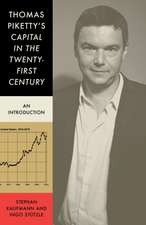Historical Capitalism
Autor Immanuel Maurice Wallersteinen Limba Engleză Paperback – 31 dec 1995
Particular attention is focused on the emergence and development of a unified world market, and the concomitant international division of labour. Wallerstein argues forcefully, against the current of much contemporary opinion, that capitalism has brought about an actual, not merely relative, immiseration in the countries of the Third World. The economic and social problems of underdeveloped countries will remain unresolved as long as they remain located within a framework of world capitalism.
Historical Capitalism, with its continuation Capitalist Civilization, is a welcome and stimulating synthesis of one of the most challenging and influential assessments of capitalism as a world-historic mode of production.
Preț: 202.31 lei
Nou
Puncte Express: 303
Preț estimativ în valută:
38.71€ • 40.52$ • 32.22£
38.71€ • 40.52$ • 32.22£
Carte tipărită la comandă
Livrare economică 26 martie-01 aprilie
Preluare comenzi: 021 569.72.76
Specificații
ISBN-13: 9781859841051
ISBN-10: 1859841058
Pagini: 163
Dimensiuni: 136 x 216 x 13 mm
Greutate: 0.23 kg
Ediția:Revised
Editura: VERSO
Locul publicării:United Kingdom
ISBN-10: 1859841058
Pagini: 163
Dimensiuni: 136 x 216 x 13 mm
Greutate: 0.23 kg
Ediția:Revised
Editura: VERSO
Locul publicării:United Kingdom
Notă biografică
Immanuel Wallerstein is director of the Fernand Braudel Center at the State University of New York. His books include a three-volume study, The Modern World-System, Historical Capitalism, and, cowritten with Etienne Balibar, Race, Nation, Class.
Textul de pe ultima copertă
In this short, highly readable book Immanuel Wallerstein provides a condensation of the central ideas of his monumental study of capitalism as an integrated, historical entity: The Modern World-System. In developing an anatomy of capitalism over the past five centuries, Wallerstein traces those elements that have constantly changed and evolved, while giving equal attention to features of historical capitalism that have necessarily remained constant. Particular attention is focused on the emergence and development of a unified world market, and the concomitant international division of labour. Wallerstein argues forcefully, against the current of much contemporary opinion, that capitalism has brought about an actual, not merely relative, immiseration in the countries of the Third World. The economic and social problems of underdeveloped countries will remain unresolved as long as they remain located within a framework of world capitalism.










